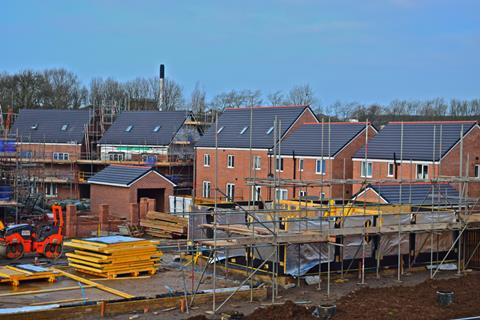Zoopla records first signs of brakes on house price growth despite continued high demand
Economic headwinds and an increasing supply of new homes into the market will start to bring house price growth down to more “sustainable” levels over the course of the year, according to the latest forecast from online property firm Zoopla.
The business said annual house price inflation had dropped to 8.1% in the year to February, down from 8.4% in January, while there were initial signs that demand for homes, albeit still at historically high levels, was starting to reduce, and supply of houses was starting to pick up.

Gráinne Gilmore, head of research at Zoopla, said that high buyer demand and rising supply meant that housing market activity levels will remain “elevated” in the short term. However, she said: “As we move into H2, economic headwinds, including the rising cost of living and rising mortgage rates will act as a brake on price growth, with annual value rises returning to more sustainable levels.”
Housebuilders have been reliant on high levels of house price growth over the last year to offset growing cost inflation in their supply chains, which is commonly running at above 5% and is predicted by many to increase this year.
Zoopla’s monthly house price index said demand in the Week ending March 20 was 65% above the five year average – but that it have fallen in all parts of the UK from the highs seen at the start of the year. The flow of new supply on to the market was in the same week 5% up on the five year average, a trend Zoopla said was likely to continue as price growth and high demand triggers homeowners to make a move.
The firm is also predicting that the volume of house sales will return to pre-pandemic levels, of around 1.2m, this year, after having soared in the post-lockdown boom of 2021.
The predictions from Zoopla came as the Bank of England published data showing that the number of mortgage approvals for house purchase dropped in February to 70,993 – its first drop since October last year. However, the figure remains well above the average in the year prior to the pre-pandemic of 66,700.
The Bank of England figures also show the impact of house price inflation – with the value of mortgage approvals rising slightly even while the number of approvals dropped back.
Lawrence Bowles, director of research at Savills, said the average value of a mortgage loan was now 10.4% higher than this time last year and came alongside an increase in the average interest rate banks are charging.
He said: “We can expect to see further rises in mortgage interest costs. That will limit what buyers can pay, especially with the affordability stress tests currently in place and rapidly rising energy prices putting pressure on household finances.
“While the imbalance between resilient demand and very low level of stock available is continuing to support price growth, we can expect to see mortgage advances and other measures of transaction activity start to ease as we head towards the autumn.”
Walid Koudmani, chief market analyst at financial brokerage XTB said: “As the Bank of England adjusts its policy further we could be seeing a continuation of this downtrend unless some incentives are put in place to restore longer term confidence.”










No comments yet